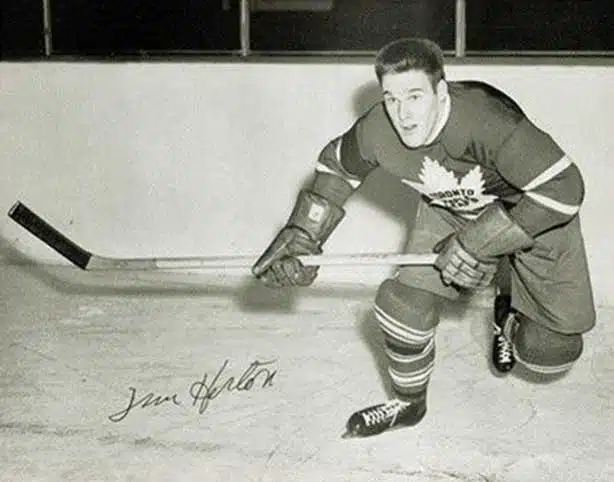Tim Horton | Fatal Alcohol & Drug-Related Car Crash

Alcohol, drugs, and sports cars are a dangerous combination.
Sadly, this proved to be the case for “Tim” Horton, a legendary Canadian hockey star best remembered today by the international coffee and doughnut chain that bears his name.
Tim Horton’s Death
After playing against his former team, the Maple Leafs, in Toronto in 1974, Horton was traveling south to Buffalo along the Queen Elizabeth Way in his sports car, an Italian-made De Tomaso Pantera. He had experienced both a jaw and ankle injury during play.
He stopped on his way to meet with his business partner Ron Joyce and also phoned his brother that day. Both men recognized that Horton had been drinking and attempted to dissuade him from continuing his drive.
In the early hours of February 21, 1974, Horton lost control of his vehicle at high speed, flipping it several times and being ejected from the vehicle.
He was pronounced dead at St. Catharines General Hospital, with the news originally reporting his death as due to a car accident without additional details.
Cause Of Death
Freedom of Information requests submitted by the Ottawa Citizen newspaper in 2005 would reveal, through the official autopsy report, that the famed ice hockey player:
- was not wearing a seatbelt
- had a blood alcohol level of almost twice the legal limit
- had a half-empty bottle of vodka in the car with him
- was in unlawful possession of the stimulant Dexedrine and sedative Dexamyl (recent use confirmed by blood amobarbital levels)
No painkiller use was suspected despite his injuries.
About Tim Horton
Miles Gilbert Horton was born in 1930 and was raised in the Canadian province of Ontario with his brother, Gerry Horton. “Tim” grew up playing hockey from a young age and was signed to the Toronto Maple Leafs organization in 1947, before playing hockey at St. Michael’s College.
He was then placed with the Pittsburgh Hornets in the American Hockey League, where he played for the better part of three seasons before moving up to Toronto and playing his first NHL game in 1950.
Maple Leafs
Horton would return to the NHL and earn a regular spot with the Maple Leafs two years later, despite serious injuries sustained in the 1954 season.
Recovering by the middle of the following season, Horton’s fundamentals and slap shot would help lead the Maple Leafs to four Stanley Cup victories between 1952 and 1970.
Between February 1961 and February 1968, Horton would also appear in 486 consecutive regular season games, setting a now-broken NHL record for consecutive games by a defenceman.
He would also set a Leafs team record for playoff points by a defenceman in 1962, scoring three goals with 13 assists in 12 playoff matches.
Horton would appear in seven National Hockey League All-Star Games during this time, being named to the NHL First Team three times and the NHL Second Team three times.
Post Maple-Leafs
In 1970, the aging star player was traded to the New York Rangers and would play a full season before being drafted to the Pittsburgh Penguins. However, Horton suffered a broken ankle and shoulder separation, and would only play 44 games and score 11 points with the team.
In 1972, at age 42 and now considerably nearsighted, Horton was acquired by Punch Imlach of the Buffalo Sabres, a former general manager of the Maple Leafs. And, despite concerns, by 1973 Horton helped bring the Sabres to their first playoff.
Horton played his final NHL games for the Sabres in 1974.
Entrepreneurship
Horton, who went by Tim, also spent a portion of his time on a variety of business ventures, including both a hamburger restaurant and Studebaker auto dealership in Toronto.
But his greatest success occurred when he, along with his partner Ron Joyce, opened the first Tim Horton’s Doughnut Shop in Hamilton, Ontario, in 1964, during his time with the Maple Leafs.
By his death in 1974, this simple donut shop had grown into a multi-million-dollar franchise system with 40 locations, and as of this writing operates nearly 4,600 stores in Canada and 620 in the United States.
Recovery Is Possible
There is no evidence that Tim Horton ever sought treatment for either alcohol or drug abuse before his death. Nor is it clear if his alcohol and prescription drug abuse was chronic or influenced by co-occurring mental health concerns.
Whatever the case, Americans who struggle with drug and alcohol abuse today have widespread access to detox and addiction treatment services, including comprehensive dual diagnosis care.
To learn more about your options, please contact Ark Behavioral Health today.
Written by Ark Behavioral Health Editorial Team
©2024 Ark National Holdings, LLC. | All Rights Reserved.
This page does not provide medical advice.
Encyclopedia Britannica - Tim Horton | Biography, Restaurants, Death, & Facts
NHL - Tim Horton Stats and News
Ottawa Citizen - Marking Tim Horton’s death, 40 years after

Questions About Treatment?
Ark Behavioral Health offers 100% confidential substance abuse assessment and treatment placement tailored to your individual needs. Achieve long-term recovery.
100% confidential. We respect your privacy.
Prefer Texting?
Our friendly support team is here to chat 24/7. Opt out any time.







 Learn More
Learn More








